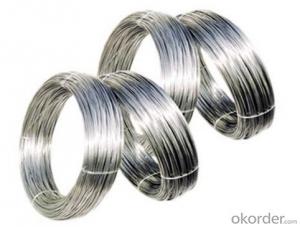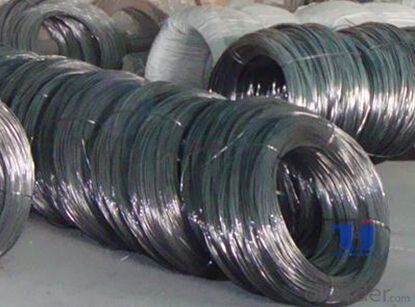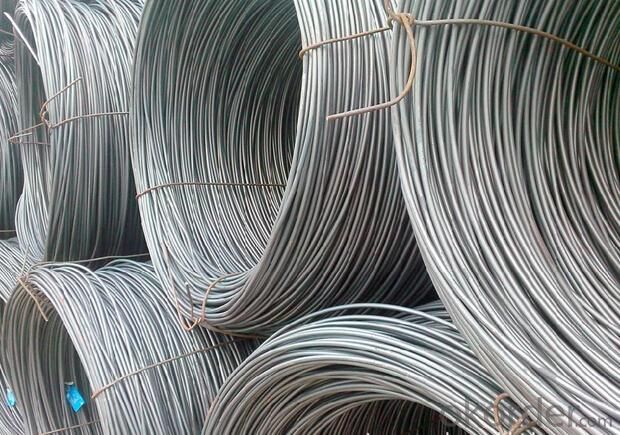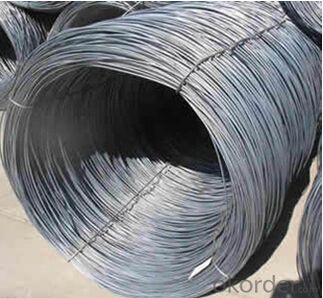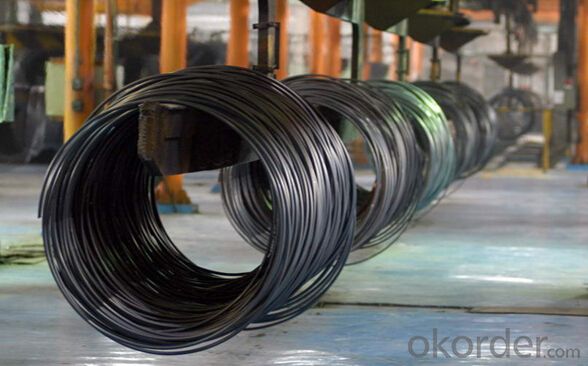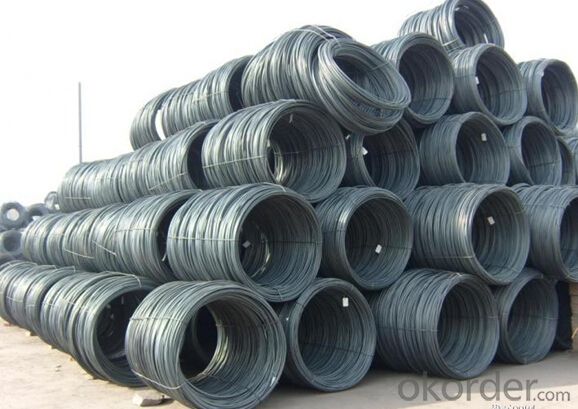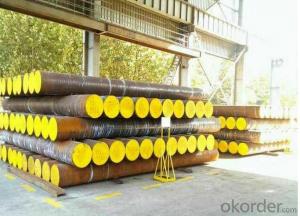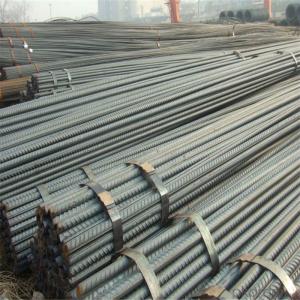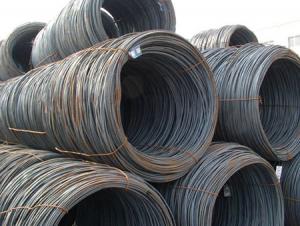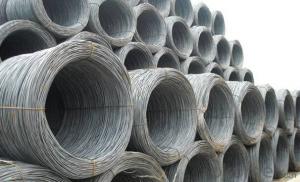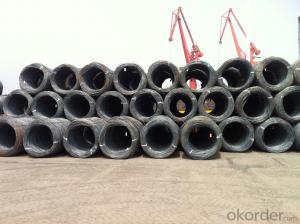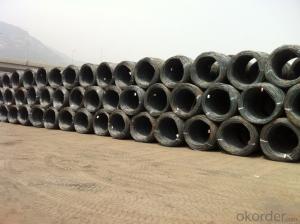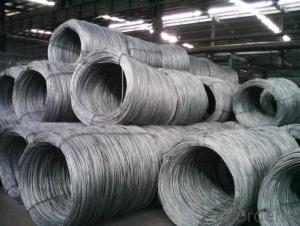Grade SAE 1008 Steel Wire Rods Building Construction Materials
- Loading Port:
- Tianjin
- Payment Terms:
- TT OR LC
- Min Order Qty:
- 25 m.t.
- Supply Capability:
- 10000 m.t./month
OKorder Service Pledge
OKorder Financial Service
You Might Also Like
Specification
Building Construction Materials SAE 1008 Steel Wire Rods
Specification of SAE1008 Steel Wire Rods
| Steel Grade | Q195-Q235,Q235,SAE 1008-1018 Steel Wire Rod |
| Diameter | 5,5.5, 6.5, 7,8, 9,10, 12,14,20mm.etc. |
| Coil weight | 1.8-2.1mts |
| Application | drawing, construction materials, machinery parts, construction for Houses, Bridges, Roads. |
| Deliver Time | 7-20 working days after receipt of L/C or deposit by T/T |
| Packing | In coils, loading in container or by bulk vessel |
| Payment terms | 1).100% irrevocable L/C at sight. |
| 2).30% T/T prepaid and the balance against the copy of B/L. | |
| 3).30% T/T prepaid and the balance against L/C |
Chemical Composition of SAE1008 Steel Wire Rods
Grade | Chemical Composition(%) | |||||
C | Mn | Si | S | P | Cr | |
SAE1006B | 0.03~O.07 | ≤0.32 | ≤0.30 | ≤0.045 | ≤0.040 | 0.3-0.35 |
Mechanical properties | ||||||
Yield strength(N/mm2) | Tensile strength(N/mm2) | Elongation(%) | ||||
250-280 | 350-380 | ≥32 | ||||
Grade | Chemical Composition(%) | |||||
C | Mn | Si | S | P | Cr | |
SAE1008B | 0.10max | 0.3~O.50 | 0.15max | 0.050max | 0.040 max | 0.3-0.35 |
Mechanical properties | ||||||
Yield strength(N/mm2) | Tensile strength(N/mm2) | Elongation(%) | ||||
≥195 | 315-430 | ≥30 | ||||
Company Information
CNBM International Corporation is the most import and export platform of CNBM group(China National Building Material Group Corporation) ,which is a state-owned enterprise, ranked in 270th of Fortune Global 500 in 2015.
With its advantages, CNBM International are mainly concentrate on SAE1008 steel wire rods and other special steels
, and devotes herself for supplying high quality series of refractories as well as technical consultancies and logistics solution.
After-sale service | CNBM provides the services and support you need for every step of our cooperation. We’re the business partners you can trust; you can relax and get on with doing business. |
For any problem, please kindly contact us at any your convenient time, we’ll reply you in our first priority within 24 hours | |
Advantages | Industry experience over 20 years. |
Shipment of goods -More than 70 countries worldwide. | |
The most convenient transport and prompt delivery. | |
Competitive price with best service. | |
High technical production line with top quality products. | |
High reputation based on best quality products. |
Products Show
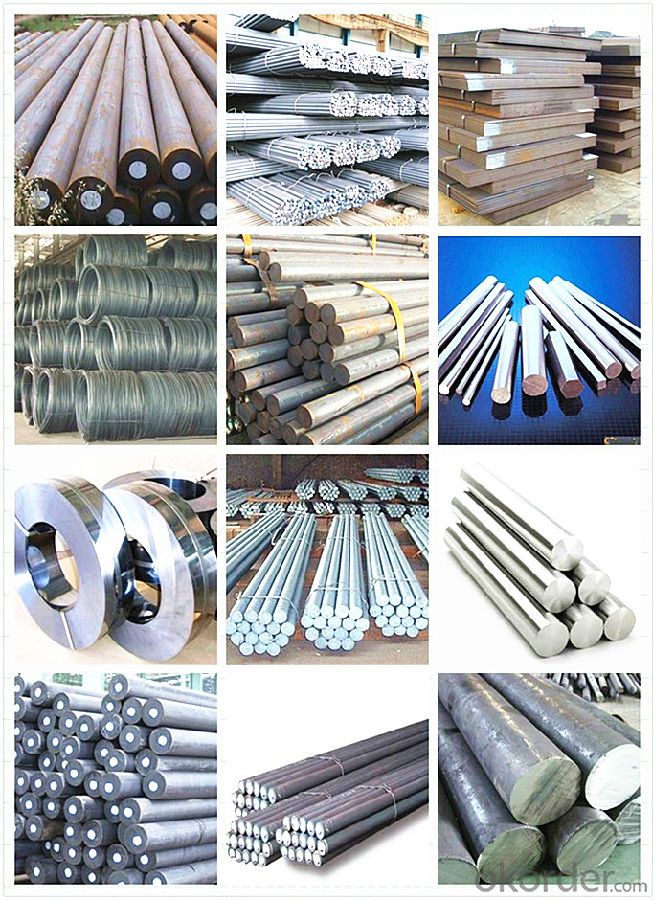
FAQ
Are you a trading company or manufacturer? | Manufacturer |
What’s the MOQ? | 3 metric ton |
What’s your delivery time? | 15-35 days after downpayment received |
Do you Accept OEM service? | Yes |
what’s your delivery terms? | FOB/CFR/CIF |
What's the Payment Terms? | 30% as deposit,70% before shipment by T/T |
Western Union acceptable for small amount. | |
L/C acceptable for large amount. | |
Scrow ,Paybal,Alipay are also ok | |
Why choose us? | Chose happens because of quality, then price, We can give you both. |
Additionally, we can also offer professional products inquiry, products knowledge train (for agents), smooth goods delivery, excellent customer solution proposals. | |
What's your available port of Shipment? | Main Port, China |
What’s your featured services? | Our service formula: good quality+ good price+ good service=customer's trust |
Where are your Market? | Covering more than 160 countries in the world |
- Q: Can special steel be cast?
- Yes, special steel can be cast. Castings of special steel are produced using various casting methods such as investment casting, sand casting, or continuous casting, depending on the specific requirements and properties of the steel.
- Q: How does special steel ensure product reliability?
- Product reliability is enhanced by the use of special steel, which is specifically designed and manufactured to possess superior qualities. One of the key factors contributing to its reliability is its exceptional strength and durability, allowing it to withstand high levels of stress, pressure, and temperature. This ensures reliable performance even in challenging conditions. Additionally, special steel offers excellent resistance to corrosion, wear, and fatigue. This is achieved through the addition of various alloying elements and meticulous heat treatment processes. By minimizing the risk of degradation and failure, the reliability of the product is further enhanced. Furthermore, special steel is known for its exceptional dimensional stability and accuracy. It maintains its shape and size under different operating conditions, reducing the possibility of dimensional changes that could affect overall performance and reliability. Another aspect that contributes to the reliability of special steel is its consistent and uniform composition. The manufacturing process ensures a homogeneous and controlled structure, resulting in predictable and reliable mechanical properties. This allows designers and engineers to accurately predict the behavior and performance of the steel, thereby increasing the reliability of the final product. Moreover, special steel undergoes stringent quality control measures throughout the manufacturing process to ensure it meets or exceeds industry standards and specifications. By adhering to these strict quality standards, special steel manufacturers can guarantee a high level of product reliability. In conclusion, special steel offers exceptional strength, durability, resistance to corrosion and wear, dimensional stability, uniform composition, and strict quality control measures, all of which contribute to the reliable performance of products made from special steel. Therefore, it is the preferred choice in industries where reliability is of utmost importance.
- Q: How does special steel contribute to the energy industry?
- Special steel plays a crucial role in the energy industry by providing high-performance materials that are essential for the construction and operation of various energy infrastructure. It is used in the manufacturing of turbines, generators, pipelines, and other components of power plants, helping to enhance their efficiency and reliability. Special steel's superior strength, corrosion resistance, and heat resistance properties make it suitable for withstanding the demanding conditions and extreme temperatures in power generation and transmission. Additionally, special steel is used in the production of renewable energy equipment such as wind turbines and solar panels, further contributing to the sustainable growth of the energy industry.
- Q: How does special steel contribute to the automotive aftermarket industry?
- The automotive aftermarket industry greatly benefits from the use of special steel, as it offers various advantages that enhance the performance, durability, and safety of vehicles. To begin with, special steel is renowned for its exceptional strength and durability. This characteristic allows manufacturers and suppliers to create high-performance components and parts that can withstand extreme conditions and heavy usage. Engine parts, suspension systems, and chassis components all benefit from the superior strength of special steel, ensuring their longevity and reliability. Furthermore, special steel provides excellent corrosion resistance, which is crucial for automotive components exposed to different weather conditions and road environments. By utilizing corrosion-resistant steel, suppliers can produce parts that are less susceptible to rust and degradation, ultimately prolonging the lifespan of vehicles and reducing the need for frequent replacements. Additionally, special steel enables the production of lightweight components without compromising on strength. As the demand for fuel efficiency and reduced emissions continues to grow, lightweight materials are highly sought after in the automotive industry. By utilizing special steel, suppliers can create lightweight parts that contribute to improved fuel economy and overall vehicle performance. Moreover, the versatility of special steel allows for the development of complex and intricate components, which supports advancements in vehicle technology. From precision-engineered gears and shafts to specialized parts for electric vehicles, special steel can be tailored to meet specific automotive requirements, driving continuous innovation within the industry. Finally, special steel offers cost-effectiveness in the automotive aftermarket industry. While the initial cost of special steel may be higher than conventional steel, its durability and longevity result in reduced maintenance and replacement costs over time. This benefit is particularly significant for suppliers and vehicle owners, as it helps minimize expenses and ensures a higher return on investment. In conclusion, special steel plays a crucial role in the automotive aftermarket industry by providing strength, durability, corrosion resistance, lightweight properties, versatility, and cost-effectiveness. These qualities contribute to the overall performance, safety, and longevity of vehicles, making special steel an essential material in the development of high-quality aftermarket components and parts.
- Q: What are the properties of wear-resistant alloy steel?
- Wear-resistant alloy steel possesses several key properties, including high hardness, excellent toughness, and superior resistance to abrasion, impact, and wear. It is designed to withstand harsh conditions and maintain its structural integrity even when subjected to repeated friction and contact with hard surfaces. Additionally, these alloys often feature a high level of corrosion resistance, making them suitable for various applications in industries such as mining, construction, and manufacturing.
- Q: How does special steel perform in terms of fatigue strength?
- Special steel generally performs very well in terms of fatigue strength. Due to its unique composition and production process, special steel exhibits high resistance to the progressive and cumulative damage caused by cyclic loading. This makes it highly durable and reliable, even under repeated stress and strain, making it a preferred material for applications that require exceptional fatigue performance, such as aerospace, automotive, and heavy machinery industries.
- Q: What are the applications of corrosion-resistant steel?
- Corrosion-resistant steel has a wide range of applications in various industries. It is commonly used in the construction of buildings, bridges, and infrastructure in coastal areas or places with high humidity, as it can withstand exposure to corrosive elements like saltwater and moisture. It is also utilized in the automotive and aerospace industries, where it provides durability and longevity to components exposed to harsh environments. Additionally, corrosion-resistant steel is extensively used in manufacturing equipment and storage tanks for chemicals, pharmaceuticals, and food processing, as it ensures the integrity and safety of these materials.
- Q: Can special steel be used for making renewable energy equipment?
- Making renewable energy equipment is possible using special steel. Special steel, also referred to as high-performance or alloy steel, possesses various properties that make it appropriate for use in different renewable energy applications. For instance, in wind energy, special steel finds utility in crafting wind turbine components, including rotor blades, tower structures, and drive train systems. The durability and longevity of these components are ensured by the high strength and corrosion resistance of special steel, as they are consistently exposed to harsh weather conditions and mechanical stress. In solar energy, special steel can be employed in the construction of solar panels, support structures, and tracking systems. The material's exceptional thermal conductivity and resistance to deformation make it an ideal choice for effectively capturing and converting solar energy into electricity. Moreover, special steel can be utilized in the production of hydroelectric power equipment, such as turbine blades, runners, and penstocks. These components are designed to withstand the forces and pressures associated with water power generation, and special steel's high tensile strength and resistance to erosion and cavitation make it suitable for this purpose. Furthermore, in the realm of biomass energy, special steel can be used in the fabrication of bioenergy plants and equipment. Its ability to withstand high temperatures and resist corrosion makes it suitable for handling the corrosive substances and high temperatures involved in the biomass conversion process. Overall, special steel's unique combination of strength, durability, corrosion resistance, and thermal properties makes it an excellent option for manufacturing renewable energy equipment, thereby contributing to the development and sustainability of the renewable energy industry.
- Q: How does special steel resist thermal fatigue?
- Special steel is able to resist thermal fatigue due to its unique composition and properties. Thermal fatigue occurs when a material is subjected to repeated heating and cooling cycles, leading to the formation of cracks and eventual failure of the material. Special steel is specifically designed to withstand extreme temperature changes. It has a high melting point and excellent thermal conductivity, which allows it to efficiently dissipate heat and minimize thermal stress. Additionally, the steel is often alloyed with elements such as chromium, nickel, and molybdenum, which enhance its resistance to thermal fatigue. The alloying elements in special steel form a protective layer that acts as a barrier against oxidation and corrosion. This protective layer prevents the formation of cracks and improves the steel's ability to withstand thermal cycling. Furthermore, the alloying elements improve the steel's structural integrity by promoting the formation of fine and evenly dispersed microstructures. This enhances the steel's toughness and resistance to cracking. Moreover, special steel undergoes various heat treatment processes to further enhance its resistance to thermal fatigue. These processes involve controlled heating and cooling cycles, which refine the microstructure of the steel and make it more resistant to deformation and cracking. The heat treatment also helps in relieving any residual stresses that may have been induced during the manufacturing process. In summary, special steel resists thermal fatigue through its unique composition, alloying elements, and heat treatment processes. Its high melting point, excellent thermal conductivity, and protective layer against oxidation and corrosion make it highly resistant to thermal cycling. The refined microstructure and relieved residual stresses further enhance its ability to withstand repeated heating and cooling cycles without failure.
- Q: How is the hardness of special steel measured?
- The hardness of special steel is typically measured using methods such as Rockwell, Brinell, or Vickers hardness tests, which involve indenting the steel surface with a known force and measuring the resulting indentation size.
Send your message to us
Grade SAE 1008 Steel Wire Rods Building Construction Materials
- Loading Port:
- Tianjin
- Payment Terms:
- TT OR LC
- Min Order Qty:
- 25 m.t.
- Supply Capability:
- 10000 m.t./month
OKorder Service Pledge
OKorder Financial Service
Similar products
Hot products
Hot Searches
Related keywords
